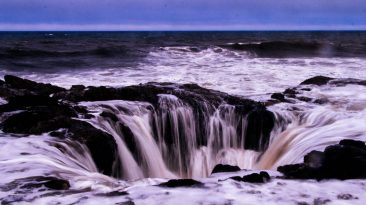You thought forest fires were bad? Wait till you hear about ocean fires. Yes, that’s right. The sea bursting into a fiery hellscape. What if every ocean on Earth burst into flames? How much fuel would be needed to ignite them? How would this affect our climate? And would the oceans evaporate?
It has happened before. A thunderstorm west of Mexico’s Yucatan Peninsula caused an underwater natural gas pipeline to leak. Electrical shocks from the storm ignited the gas, lighting the surface of the ocean on fire. A perfect storm. Literally. After five hours of this view, the fire was extinguished. But that doesn’t satisfy our curiosity.
In our scenario, we would spill oil over our oceans and ignite them all. And if all the oceans caught fire, how long until the massive amounts of smoke and soot cause serious harm to people and wildlife? Would that mean we’d say goodbye to our oceans?
For all the oceans to catch fire, they would need to be entirely covered in oil. 71% of the Earth’s surface is oceans. So we’d need a lot of oil. And it couldn’t be a thin layer. Otherwise, it wouldn’t ignite. So for this scenario, let’s cover the water with a layer of fuel at least 1 cm (0.4 in) thick. That means we’d need a total volume of 3,600 cubic km (863 cubic mi) of oil. That’s enough to fill Lake Huron in Canada.
But would there be enough oil in the world to initiate this bizarre plan? In 2016, the world consumed 5.6 billion cubic m (1.5 trillion gal) of oil. But to get this global ocean fire going, we’d need about 645 times that. If the oceans were ablaze, the first nasty byproduct would be black smoke clogging our atmosphere.
This smoke would pose a considerable health risk because it would be filled with soot particles. These would penetrate deep into our lungs, causing heart attacks, strokes or even death.
4.6 million people die each year from causes linked to air pollution. With the oceans on fire, this number would be much, much worse.
The smoke could block out the Sun and cast an eerie brown glow over the Earth. Vegetation and crops would die. The massive amounts of greenhouse gases created would help speed up global warming.
Eventually, the fire would increase the surrounding air temperatures. This could lead to storms with intense wind speeds and precipitation. And then there’s a planet-changing twist. Rising temperatures would cause ocean water to evaporate. If the fire kept burning, how long until all of our oceans disappeared?
At normal atmospheric pressure, pure water boils at 100 °C (212 °F). For saltwater, this boiling point increases slightly based on the salt concentration. If our oceans reached boiling temperatures, this would lead to a runaway greenhouse effect. The higher the temperature, the faster the water would evaporate. And with more water in the atmosphere, more heat would be trapped.
This never-ending cycle would continue to raise the Earth’s temperature. And all the oceans would be gone. Completely. Along with them, we’d lose all marine plant and animal species. Including phytoplankton, the microscopic plants that float near the ocean’s surface, performing photosynthesis, and releasing oxygen into the air.
Phytoplankton create more oxygen than all the trees on Earth. Estimates are that they produce 50 to 80% of all oxygen on the planet. In short, no more oceans would mean less oxygen, less food and, well, fewer humans. Whoever could adapt and survive would be left on a planet almost completely covered in desert.
But there’s good news. Our fossil fuel reserves aren’t capable of burning all the oceans. So unless we import some interplanetary fuel from an Earth-like planet, we will be OK.
Of course, for that, you’d need to find another Earth somewhere in the galaxy.
Sources
- “Burst Pipeline Causes Bubbling, Steaming “Eye Of Fire” To Emerge In The Gulf Of Mexico”. Li Cohen. 2021. cbsnews.com.
- “Nitrogen Fire Suppression System | Kidde Fire Systems”. 2022. kidde-fenwal.com.
- “What Happens When The Ocean Catches Fire?”. Bani Sapra. 2021. wired.me.
- “Venus Held Onto Its Water Surprisingly Well During Its History”. Matt Williams. 2020. universetoday.com.
- “Where did Venus’s water go?” 2008. esa.int.


























